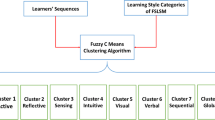Abstract
The identification of the best learning style in an Intelligent Tutoring System must be considered essential as part of the success in the teaching process. This research work presents a set of three different approaches applying intelligent systems for automatic identification of learning styles in order to provide an adapted learning scheme under different software platforms. The first approach uses a neuro-fuzzy network (NFN) to select the best learning style. The second approach combines a NFN to classify learning styles with a genetic algorithm for weight optimization. The learning styles are based on Gardner’s Pedagogical Model of Multiple Intelligences. The last approach implements a self-organising feature map (SOM) for identifying learning styles under the Felder-Silverman Model. The three approaches are used by an author tool for building Intelligent Tutoring Systems running under a Web 2.0 collaborative learning platform. The tutoring systems together with the neural networks can also be exported to mobile devices. We present results of three different tutoring systems produced by three implemented authoring tools.
Access this chapter
Tax calculation will be finalised at checkout
Purchases are for personal use only
Preview
Unable to display preview. Download preview PDF.
Similar content being viewed by others
References
Nichols, M.: E-Learning in Context. E-Primer Series. Laidlaw College, Auckland (2008)
Seibel, C.: An Examination of Teaching and Learning Online. University of Saskatchenwan, Canada. Occasional papers in Educational Technology (2008)
Ally, M.: Foundations od educational theory for online learning. In: The theory and practice of online learning, vol. 1(1), pp. 15–44. AU Press, Canada (2008)
Felder, R.: Matters of style. Department of Chemical Engineering North Carolina State University Raleigh. ASEE Prism 6(4), 18–23 (1996)
Coffield, F., Moseley, D., Hall, E., Ecclestone, K. (eds.): Learning Styles and Pedagogy in post-16 Learning: A Systematic and Critical Review. Learning and Skills Research Centre, Wiltshire (2004)
Felder, R., Silverman, L.: Learning and Teaching Styles in Engineering Education. North Carolina State University and Institute for the Study of Advanced Development. Engineering Education 78(7), 674–681 (1988)
SCORM, The Sharable Content Object Reference Model, April 22 (2010), http://www.adlnet.org
Gardner, H.: Frames of Mind: The theory of multiple intelligences. Basic Books, New York (1983)
Negnevitsky, M.: Artificial Intelligence: A guide to Intelligent Systems, 2nd edn. Addison-Wesley, Reading (2005)
Jang, J.: ANFIS: Adaptive Network-based Fuzzy Inference Systems. IEEE Transactions on Systems, Man and Cybernetics 23(3), 665–685 (1993)
Kohonen, T.: Self-Organization and Associative memory, 3rd edn. Springer, Heidelberg (1989)
Burke, R.: Hybrid Recommender Systems: Survey and Experiments. User Modeling and User-Adapted Interactions 12(4), 331–370 (2002)
Carmona, C., Castillo, G., Millán, E.: Designing a Bayesian Network for Modeling Student’s Learning Styles. In: Díaz, P., Kinshuk, Aedo, I., Mora, E. (eds.) ICALT 2008, pp. 346–350. IEEE Computer Society, Los Alamitos (2008)
Graf, S., Kinshuk, Liu, T.: Identifying Learning Styles in Learning Management Systems by Using Indications from Students’ behavior. In: Díaz, P., Kinshuk, Aedo, I., Mora, E. (eds.) ICALT 2008, pp. 482–486. IEEE Computer Society, Los Alamitos (2008)
Limongelli, C., Sciarrone, F., Vaste, J.: LS-PLAN: An Effective Combination of Dynamic Courseware Generation and Learning Styles in Web-based Education. In: Nejdl, W., Kay, J., Pu, P., Herder, E. (eds.) AH 2008. LNCS, vol. 5149, pp. 133–142. Springer, Heidelberg (2008)
Zatarain-Cabada, R., Barrón-Estrada, M.L., Sandoval, G., Osorio, M., Urías, E., Reyes-García, C.A.: Authoring Neuro-fuzzy Tutoring Systems for M and E-Learning. In: Aguirre, A.H., Borja, R.M., Reyes-García, C.A. (eds.) MICAI 2008. LNCS (LNAI), vol. 5317, pp. 789–796. Springer, Heidelberg (2008)
Murray, T., Blessing, S., Ainsworth, S.: Authoring Tools for Advanced Technology Learning Environments. Kluwer Academic Publishers, Dordrecht (2003)
de Jong, T., Limbach, R., Gellevij, M., Kuyper, M., Pieters, J., Joolingen, W.R.: Cognitive tools to support the instructional design of simulation-based discovery learning environment: the SIMQUEST authoring system. In: Plomp, T., van den Akker, J., Nieveen, N., Gustafson, K. (eds.), pp. 215–224. Kluwer Academic Publishers, The Netherlands (1999)
Arruarte, A., Fernández, I., Ferrero, B., Greer, J.: The IRIS Shell: How to build ITSs from Pedagogical and Design Requisites. International Journal of Artificial Intelligence in Education 8, 341–381 (1997)
Brusilovsky, P., Schwarz, E.: Web-based education for all: A tool for develop-ing adaptive courseware. Computer Networks and ISDN Systems 30(1-7), 291–300 (1998)
Carmona, C., Bueno, D., Guzmán, E., Conejo, R.: SIGUE: Making Web Courses Adaptive. In: De Bra, P., Brusilovsky, P., Conejo, R. (eds.) AH 2002. LNCS, vol. 2347, pp. 376–379. Springer, Heidelberg (2002)
Weber, G., Kuhl, H.-C., Weibelzahl, S.: Developing adaptive internet based courses with the authoring system NetCoach, http://wwwis.win.tue.nl/ah2001/papers/GWeber-UM01.pdf
Specht, M., Kravcik, M., Klemke, R., Pesin, L., Hüttenhain, R.: Adaptive Learning Environment (ALE) for Teaching and Learning in WINDS. In: De Bra, P., Brusilovsky, P., Conejo, R. (eds.) AH 2002. LNCS, vol. 2347, pp. 572–581. Springer, Heidelberg (2002)
Attewell, J.: Mobile technologies and learning: A technology update and mlearning project summary. Learning and Skills Development, http://www.m-learning.org/reports.shtml
Romero, C., Ventura, S., Hervás, C., De Bra, P.: An Authoring Tool for Building Both Mobile Adaptable Tests and Web-Based Adaptive or Classic Tests. In: Wade, V.P., Ashman, H., Smyth, B. (eds.) AH 2006. LNCS, vol. 4018, pp. 203–212. Springer, Heidelberg (2006)
Attewell, J.: From Research and Development to Mobile Learning: Tools for Education and Training Providers and their Learners, http://www.mlearn.org.za/CD/papers/Attewell.pdf
Author information
Authors and Affiliations
Editor information
Editors and Affiliations
Rights and permissions
Copyright information
© 2010 Springer-Verlag Berlin Heidelberg
About this chapter
Cite this chapter
Zatarain, R., Barrón-Estrada, L., Reyes-García, C.A., Reyes-Galaviz, O.F. (2010). Applying Intelligent Systems for Modeling Students’ Learning Styles Used for Mobile and Web-Based Systems. In: Castillo, O., Kacprzyk, J., Pedrycz, W. (eds) Soft Computing for Intelligent Control and Mobile Robotics. Studies in Computational Intelligence, vol 318. Springer, Berlin, Heidelberg. https://doi.org/10.1007/978-3-642-15534-5_1
Download citation
DOI: https://doi.org/10.1007/978-3-642-15534-5_1
Publisher Name: Springer, Berlin, Heidelberg
Print ISBN: 978-3-642-15533-8
Online ISBN: 978-3-642-15534-5
eBook Packages: EngineeringEngineering (R0)




